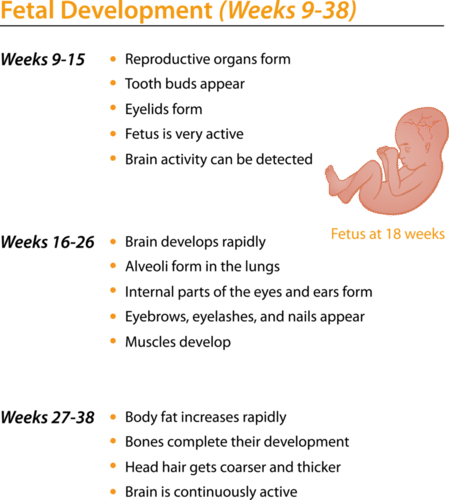产前发育
章节大纲
-
What characterizes this fetus as human?
::这个胎儿是什么人?The human fetus . Notice the details in the face and hands. Compare this to the human embryo , and the amount of growth and is truly remarkable.
::人类胎儿。 注意面部和手部的细节。 把它与人类胚胎和生长量相比较, 并且非常惊人。Growth and Development of the Fetus
::胎儿的增长和发展From the end of the eighth week until birth, the developing human organism is referred to as a fetus . Birth typically occurs at about 38 weeks after , so the fetal period generally lasts about 30 weeks. During this time, as outlined in Figure , the organs complete their development. The fetus also grows rapidly in length and weight.
::从出生前第8周结束算起,发育中的人体有机体被称为胎儿,出生时间通常为产后38周左右,因此胎儿期一般为30周左右,在此期间,如图所示,器官完成发育,胎儿的长度和体重也迅速增长。Fetal Development (Weeks 9–38). Organ development is completed and body size increases dramatically during weeks 9–38.
::胎儿发育(Weeks 9-38):在9-38周期间,器官发育已经完成,身体规模急剧增加。By the 38th week, the fetus is fully developed and ready to be born (see Figure ). A 38-week fetus normally ranges from 36 to 51 centimeters (14–20 inches) in length and weighs between 2.7 and 4.6 kilograms (about 6–10 pounds).
::到第38周,胎儿已经完全发育成熟并准备出生(见图 ) 。 38周的胎儿长度通常在36至51厘米(14至20英寸)之间,体重在2.7至4.6公斤(约6至10磅)之间。A 38-week-old fetus has completed development and will soon be born.
::一个38周大的胎儿已经完成发育,不久将出生。Summary
::摘要-
The fetal stage begins about two months after fertilization and continues until birth.
::胎儿阶段在受孕两个月后开始,一直持续到出生为止。 -
During this stage, organs continue to develop, and the fetus grows in size.
::在这一阶段,器官在继续发展,胎儿的体积在增加。
Review
::回顾-
Make a flow chart of embryonic and fetal development.
::绘制胚胎和胎儿发育的流程图。 -
Why would an embryo be more susceptible than a fetus to damage by toxins?
::为什么胚胎比胎儿更容易受到毒素损害?
-
The fetal stage begins about two months after fertilization and continues until birth.


